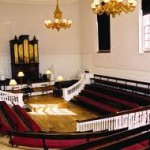CBSO at Symphony Hall April 12 2012 Edward Gardner

This post-Easter presentation of Elgar’s Dream of Gerontius, repeated at the Barbican two days later, was always going to be special, and so it turned out, if not for the reasons previously envisaged.
It was to have been Andris Nelsons’ first-ever ‘Gerontius’, and his entry into the gallery of CBSO principal conductors who have directed the work before him. But family priorities, with the sickness of his infant daughter, quite rightly took sway, and he reluctantly decided to withdraw.
As the luck of scheduling diaries would have it, principal guest
conductor Edward Gardner was free to step into the breach, and what a
memorable job he made of it, this only his own second ‘Gerontius’.
Gardner’s other hat as music director of English National Opera stood
him in good stead here, bringing an instinctive sense of drama and
pacing. On Good Friday the Mariinsky Theatre’s Parsifal had brought
Gerontius to mind; here it was the other way round.
Gardner’s tempi, flowing effortlessly between sections, were bravely
broad, not sanctimoniously so as in the case of ancient interpreters,
but clearly envisioned, aware of their goals. Within these lavish
paragraphs he was able to summon so much detail, whether from the
perennially remarkable CBSO Chorus (and how fresh and youthful they
sounded where necessary!) or from the responsive and supple orchestra
itself.
There were two incidents I’d never noticed before in five decades of
loving the work, but Gardner’s acuity brought them out: the suspenseful
timpani roll over a prolonged organ pedal at the end of Praise to the
Holiest, and the shriek from piccolos and other woodwind as the Soul
of Gerontius glimpses the searing perfection of God for the minutest
instant before gladly consigning himself to Purgatory.
Two of the three soloists were disappointing: tenor Robert Murray, a
late replacement for the indisposed Toby Spence, delivered beautiful
vocal tone and intelligence of diction, but little of the anguished
message of Cardinal Newman’s text; Sarah Connolly’s Angel, somewhat
harsh of timbre, began with a quiet radiance but later failed to
console; but James Rutherford was in his customary commanding,
authoritative form as the Priest despatching Gerontius into the
afterworld, and as the awesome Angel of the Agony interceding for him
as judgement approaches.
The night belonged to the CBSO, its Chorus and Gardner, and an amazing
minute-plus of silence followed the performance. That must have sent
the live BBC broadcasters into their own personal little purgatory,
until the applause at last erupted.
CM







